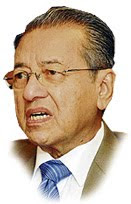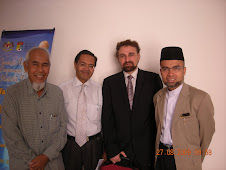2008/07/11
HARDEV KAUR: Difficult for G8 to ’shake off its elitist baggage’
By : Hardev Kaur
Email to friend Print article
TWO different groupings — D8 and G8 — met this week. D8, a grouping of developing countries, met in Kuala Lumpur, and G8, comprising the most industrialised nations in the world, met in Hokkaido, Japan.
Issues confronting both groupings are the same — rising food and fuel prices, commodity prices, poverty, inflationary pressures, slow economic growth, rising unemployment, increasing protectionism, environment and climate change.
While these problems are global and not confined to the developing countries, D8, or the African continent, the fact is that the most fragile and poor are the most vulnerable. The rich and developed world cannot continue to ignore their plight in today’s interconnected world.
Undoubtedly, the list of issues and agenda is long and difficult even for the leaders of rich nations to deal with satisfactorily all at the same time, but the world’s population — especially those living on US$1 (RM3.25) a day and less — hope some relief will come their way. They and millions others around the world have been disappointed each time the leaders meet.
There is always a lot of talk, promises and pledges made with little concrete action to show when leaders meet again the next time. The communiqués and statements do not feed the hungry, nor do they provide a roof over the heads of the poor, or help finance the education of children, or take care of the sick and the elderly.
The G8 is not doing enough. For example, at their meeting in Gleneagles in 2005, the leaders promised US$50 billion (RM160 billion) for the poor, of which at least US$25 billion was promised for Africa, but only US$7 billion or 14 per cent has been disbursed so far and they are endangering agreed Millennium Development Goals.
The situation has worsened — even the president of the World Bank, Robert Zoellick, describes it as “double jeopardy” and says the G8 needs to do more.
Then again, the G8 leaders do not take into account the effect their decisions have on the poor, those in developing and emerging economies. The devastating effect of the 1985 Plaza Accord on Southeast Asian countries, including Malaysia, is just one example. (The G7 leaders meeting in New York’s Plaza Hotel had agreed to force the currencies of especially Japan and Germany to rise against the US dollar. The yen doubled in value against the dollar in just two and a half years.)
Even if they make the right noises, their follow-up actions do not add up. The Financial Times reports that “few summits generate such a yawning gap between the rhetoric of world leaders on fighting poverty and climate change and the reality of their comfortable daily lives than at the annual G8 gathering".
With the world economy on the skids, rising inflation and the fallout from the US subprime mortgage crisis, coupled with rising fuel and food prices, the developed countries that have not kept their promise of aid in the best of economic times are falling behind even more. Very few of the developed countries have disbursed 0.7 per cent of their gross national product as agreed under the Official Development Assistance commitments.
Civil society, non-governmental organisations and others have urged the rich nations to deliver on their promises. But these calls, as always, fall on deaf ears. Jeremy Hobbs, executive director of Oxfam International, points out that “if we don’t get leadership in the G8, we are in trouble, so this summit really has to come up with some pretty substantial proposals if we are not going to see things get significantly worse — particularly for poor countries".
But there is no leadership from the G8! And the grouping can no longer adequately deal with many of the global problems among themselves.
The plight of the D8 is no better. They are not as economically powerful as the G8 and as such, their commitments are also significantly smaller. But these countries are affected by what happens in the rest of the world and their economies are vulnerable to the decisions made by the developed nations — yet they do not have a say in these decisions.
Japanese Deputy Foreign Minister Masaharu Kohno acknowledges that “all the main issues are transborder issues, be it terrorism, the food crisis or climate change. We are no longer in the era where we can be bound by national borders".
And the cosy club of the largest economies in the world, the G8, is beginning to lose its shine. The world has moved on but the G8 finds it “difficult to shake off its elitist baggage". Some of the larger economies of today, such as China — the fourth-largest in dollar terms — is not even at the main table.
France’s President Nicolas Sarkozy says it is “not reasonable” for G8 to keep meeting without emerging powers like China and India. Leaders from China, India, South Korea and Indonesia are among the 14 countries that will make a cameo appearance at the Hokkaido summit. But they are not a party to the decisions of the G8.
Thus, even before the leaders head home from the resort in Hokkaido, there are already objections from developing countries on the emissions-reductions targets set by the G8. China, India, Brazil, Mexico and South Africa declined to accept numerical targets, arguing it would suppress their economic growth.
The differences are not limited to environment and climate change but go beyond to cover disputes over how to cope with record oil and food prices. The problems confronting the G8, comprising the US, Japan, Germany, Italy, Britain, France, Canada and Russia, and the D8 — Bangladesh, Egypt, Indonesia, Iran, Malaysia, Nigeria, Pakistan and Turkey — are the same.
“If you think of the G8 as a club of the most influential countries in the global economy, it’s hard to see how you can keep China and India out,” points out Hal Hill, an economics professor at Australia National University.
As the economic power shifts to the East, the emerging economic giants cannot be marginalised and kept on the fringes. Their economic muscle must be recognised. They must be included for comprehensive and global solutions.
Subscribe to:
Post Comments (Atom)







































No comments:
Post a Comment